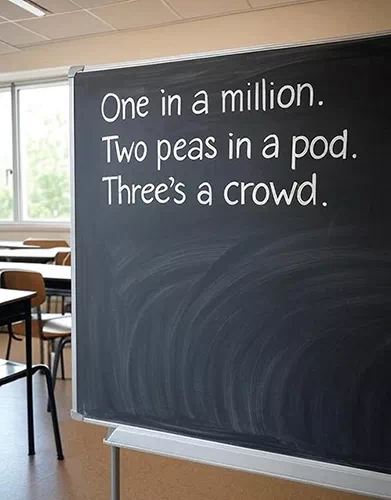
Numbers are not just for calculations or statistics. They’re a fundamental part of how we communicate, speaking a kind of secret language through a vast collection of idioms. While your calculator knows exactly what a “ten” is, your brain knows that “ten out of ten” means something entirely different.
There are countless idioms that have numbers woven into their fabric. But what do they really mean, and how can you use them?
Here’s a list of some of the most common number-related idioms, along with their real meanings and examples.
- One in a million
This idiom is used to describe someone or something that is exceptionally unique, special, or rare. It implies that a person or thing stands out as extraordinary, as if they are one out of a million possibilities.- Example: “My grandmother is one in a million; she can cook a five-course meal from scratch and still have time to teach me how to knit.”
- Two peas in a pod
This phrase describes two people who are either very similar or so inseparable they are almost like one person. It refers to people who share similar traits, behaviors, or interests, just like two peas that look nearly identical inside a pod.- Example: “The twins are like two peas in a pod. They both love hiking and finish each other’s sentences.”
- Three’s a crowd
Used when a third person is unwanted in a situation, often implying that two people are enough. This idiom is most often used when an additional person disrupts the dynamic, especially in a romantic or close-knit setting.- Example: “I didn’t join them for dinner; I figured three’s a crowd and they needed some time alone.”
- Four corners of the earth
This idiom means from all parts of the world, or everywhere. It refers to something or someone coming from or covering every direction or place globally, emphasizing vastness.- Example: “People came from the four corners of the earth to attend the global climate summit.”
- Take five
A simple phrase that means to take a short break or rest. The idiom originated in fields like music or theater, where a quick, five-minute pause was often needed to relax or regroup.- Example: “Let’s take five before we continue with the meeting. My brain needs a break!”
- At sixes and sevens
When someone is “at sixes and sevens,” they are in a state of confusion or disarray. It describes a situation or person in chaos, unsure of what to do, possibly from a historical dice game or trade guild dispute.- Example: “After the lead developer quit, the team was at sixes and sevens, unsure of their next steps.”
- Seventh heaven
This idiom refers to a state of extreme happiness or bliss. The phrase comes from religious and philosophical beliefs about a series of seven heavens, with the seventh being the highest level of joy.- Example: “When she got the job offer, she was in seventh heaven.”
- Behind the eight ball
To be “behind the eight ball” is to be in a difficult or disadvantaged position. The idiom comes from the game of pool, where being directly behind the black eight ball makes it tricky to hit another ball. It symbolizes being stuck in a tough spot.- Example: “Missing the deadline for the first phase of the project put us behind the eight ball with the client.”
- A stitch in time saves nine
This is an old but timeless idiom that means addressing a small problem early on will prevent it from becoming a much bigger issue later. The saying comes from sewing; fixing a small tear with one stitch now prevents it from growing into a much larger tear that would need many more stitches to repair.- Example: “I noticed a strange noise coming from the car’s engine. I’ll get it checked out—a stitch in time saves nine!”
- Ten out of ten
This simple phrase is used to describe something as perfect or excellent. It refers to the highest possible score and is often used to praise someone or something as flawless or outstanding.- Example: “Her presentation was ten out of ten; everyone was impressed.”
These idioms are a testament to the cultural significance of numbers in our language. While our number-to-text converter handles the literal meaning of numbers, these idioms remind us that numbers are often much more than just figures.